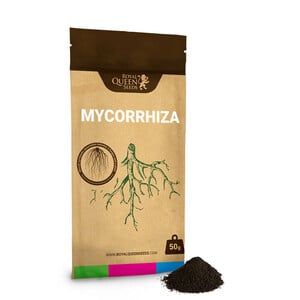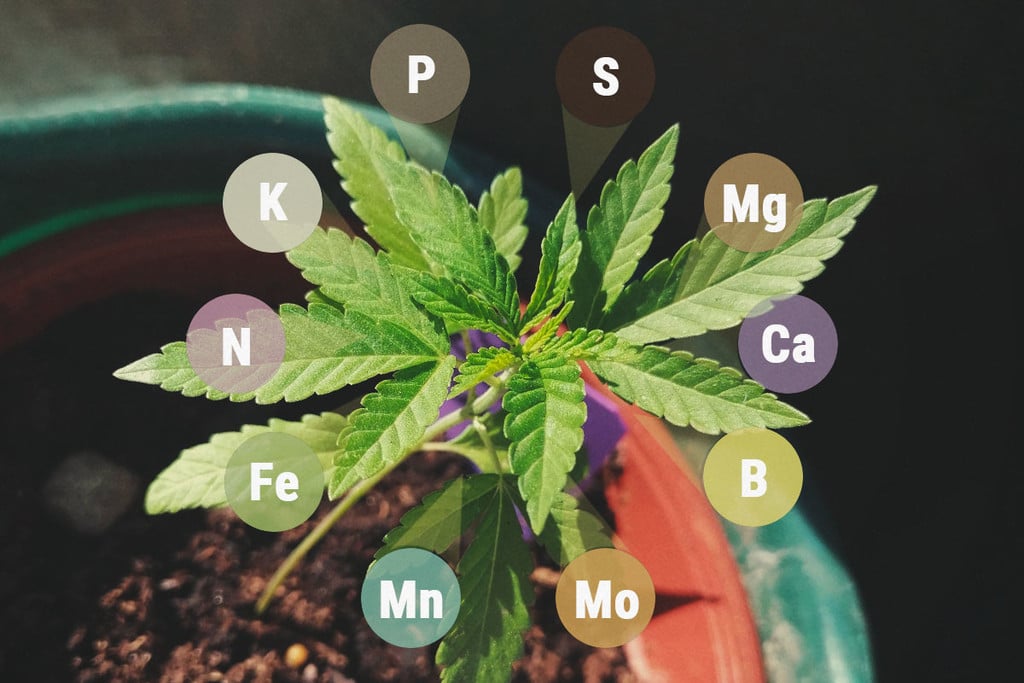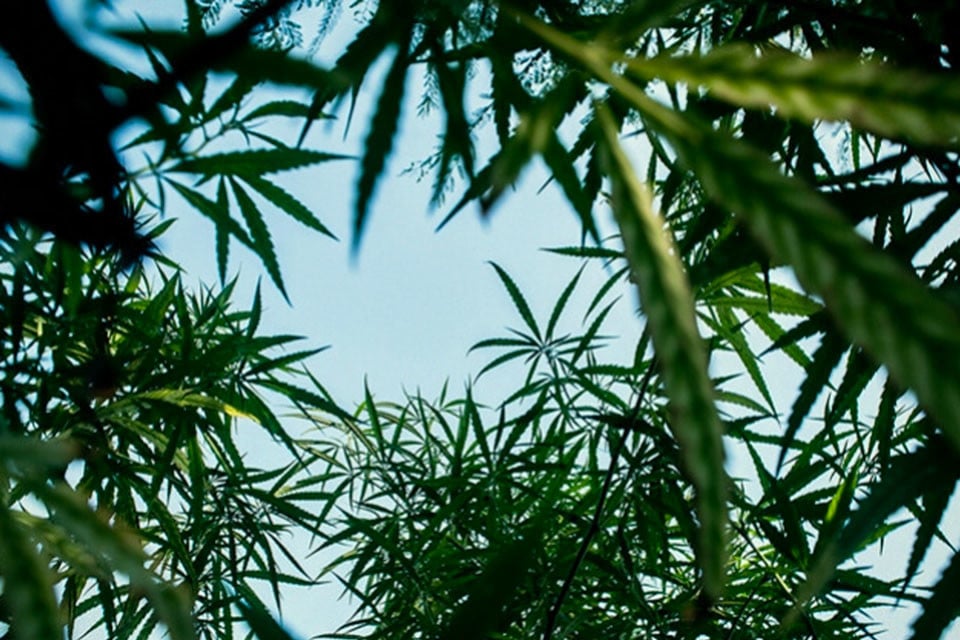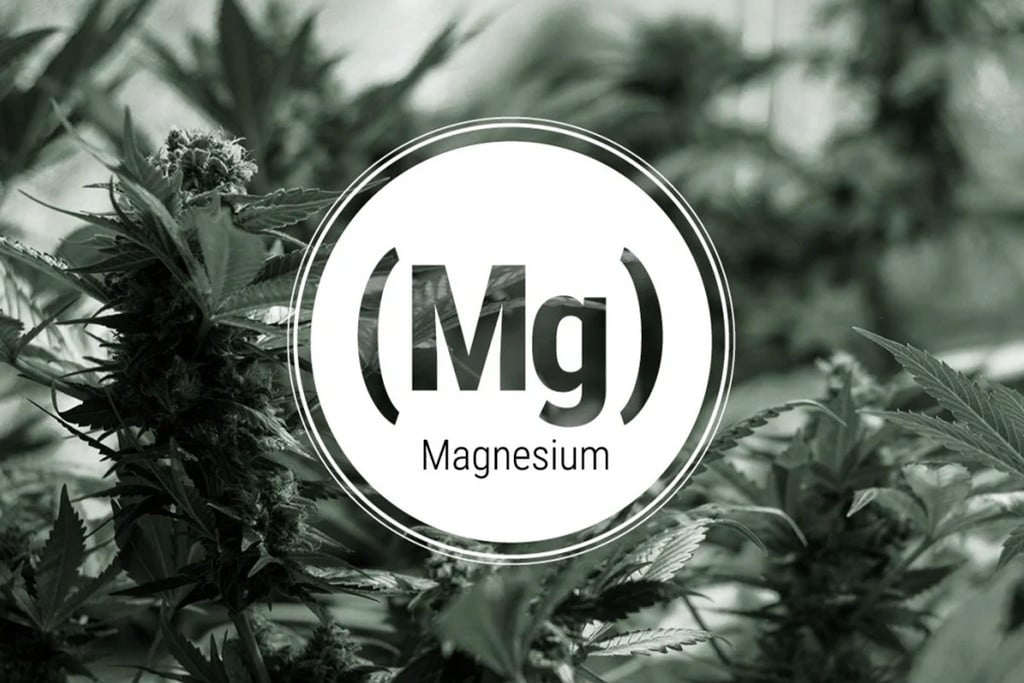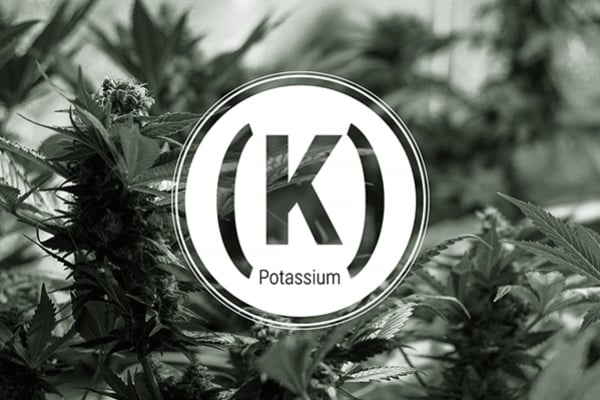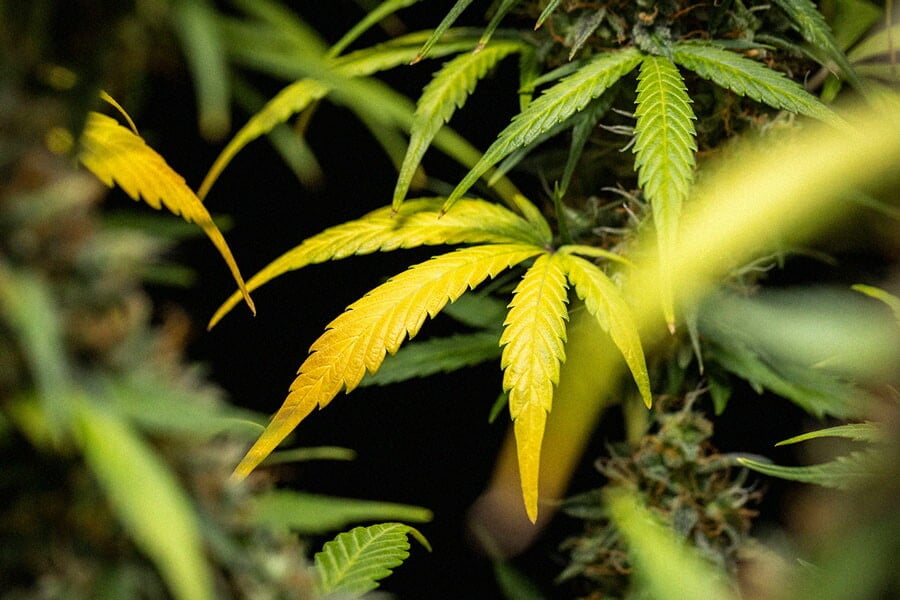.
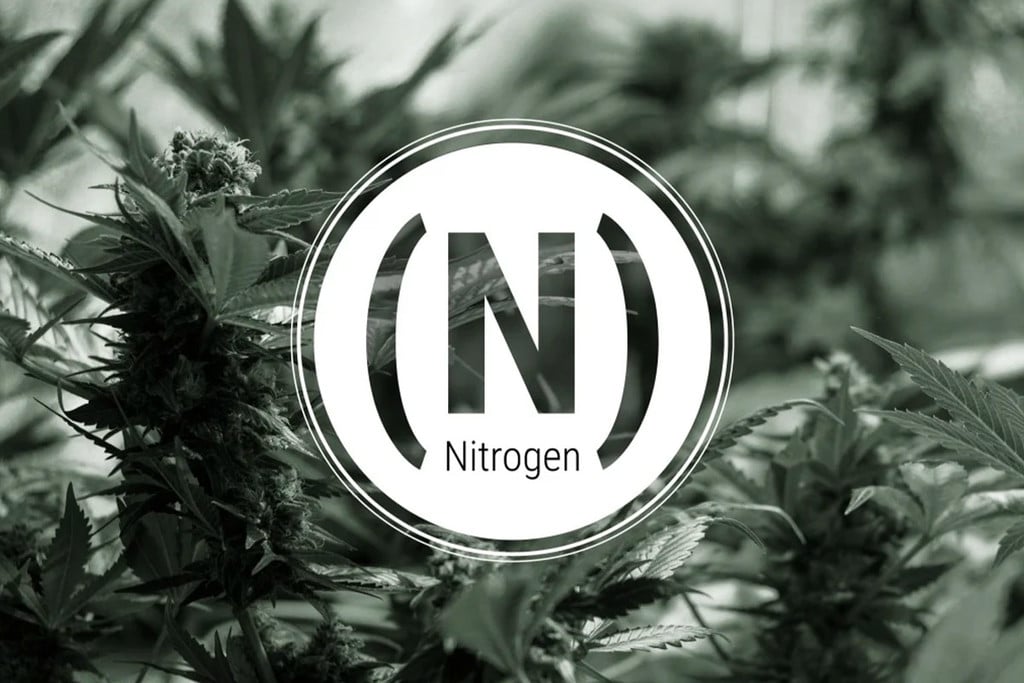
Nitrogen Deficiency in Cannabis: Signs and Solutions
Join us as we take a dive into the soil and explore everything you need to know about nitrogen deficiency. You're going to learn about the importance of this element in crop health, and what the symptoms of deficiency look like. We'll also explore the root causes and the role that soil physics and biology play. Then, you'll learn how to fix it!
Nitrogen plays an incredibly important role when growing cannabis. It facilitates photosynthesis, builds proteins, and even forms part of plant DNA. Without the proper amount, plants quickly become stunted and produce sub-par yields.
Contents:
- Understanding the role of nitrogen in cannabis growth
- Cannabis and nitrogen deficiency: signs and symptoms
- Causes of nitrogen deficiency when growing weed
- How to treat nitrogen deficiency in cannabis plants
- How to prevent nitrogen deficiency when growing marijuana
- Nitrogen: a critical cannabis macronutrient
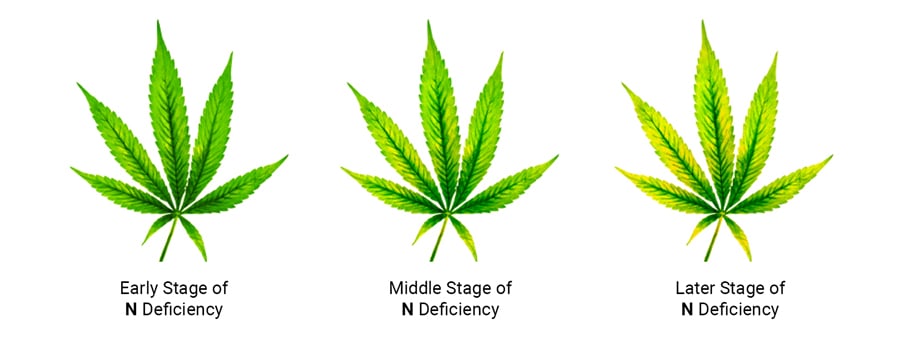
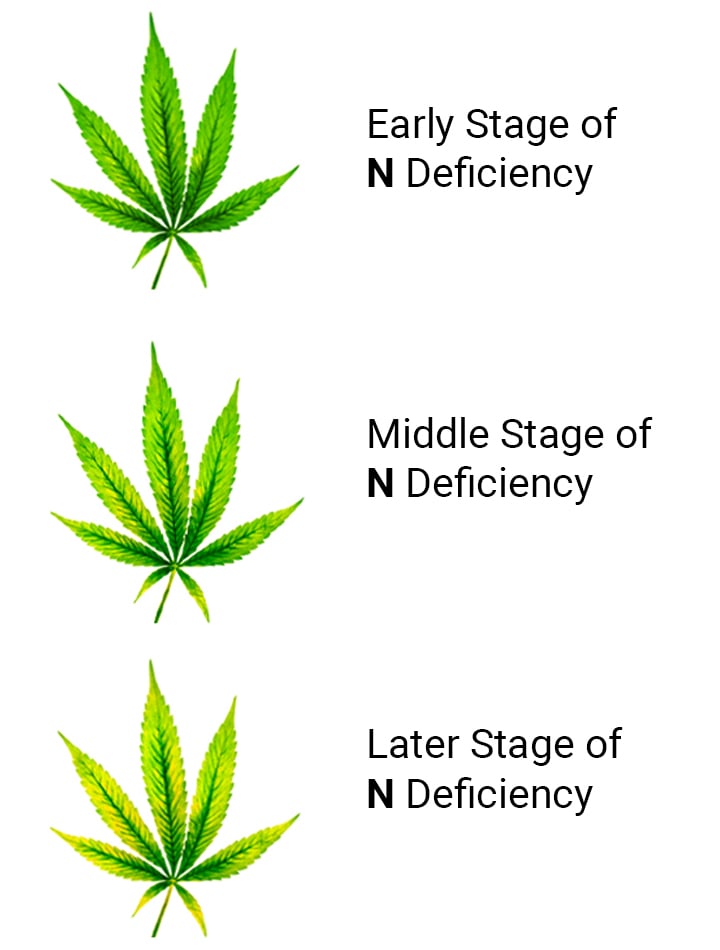
Understanding the Role of Nitrogen in Cannabis Growth
Instead of rushing to find a solution, use this as an educational experience. By the time you reach the bottom of the page, you’ll have grasped the true importance of this element, and how to manage it in the soil to prevent deficiencies in the future.
Nitrogen: A Primary Macronutrient for Cannabis
In the world of plant nutrition, elements are divided into two major categories: macronutrients and micronutrients. As their names imply, macronutrients are needed in large quantities by plants to function correctly, whereas micronutrients are only needed in small amounts.
Nitrogen belongs to the category of plant macronutrients, alongside phosphorus and potassium. Cannabis plants need large amounts of it throughout the growing cycle to build proteins, DNA, and important enzymes that drive chemical reactions. Provide ample amounts, and your plants will grow quickly, thrive, and produce great yields. If you fail to supply enough, though, your crop will start to show signs of nitrogen deficiency and exhibit impaired growth.
Function of Nitrogen in Cannabis Plants
But what exactly does nitrogen do for cannabis plants, and why is it so important that growers provide a steady supply of this element?
- Major component of chlorophyll: The chlorophyll molecule lies at the heart of the photosynthesis reaction—the means by which plants harness sunlight to turn atmospheric nitrogen into carbohydrate compounds. Nitrogen helps to build chlorophyll molecules; without it, they wouldn’t exist.
- Important part of amino acids: Nitrogen plays a fundamental part in the formation of amino acids. These tiny molecules, known as monomers, are the building blocks of much larger protein polymer compounds. These proteins have many important physiological actions, from catalysing chemical reactions to assisting immune function.
- Component of ATP: Nitrogen plays a role in the formation of adenosine triphosphate (ATP). This molecule holds the prestigious status of the cellular unit of currency. It underpins every single active reaction, from metabolic processes to gene expression.
- Forms nucleic acids: Nitrogen partially makes up the nucleic acids of DNA and RNA. Both of these molecules are critical for life, with DNA possessing the genetic information needed to construct biological components, and RNA transmitting that information to protein-building areas of the cell.
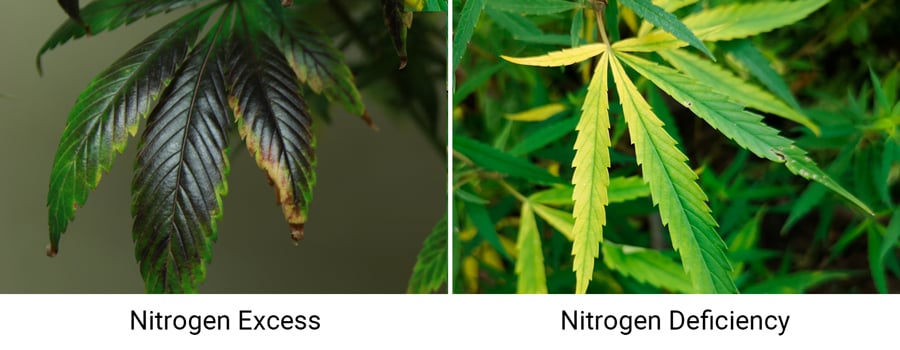
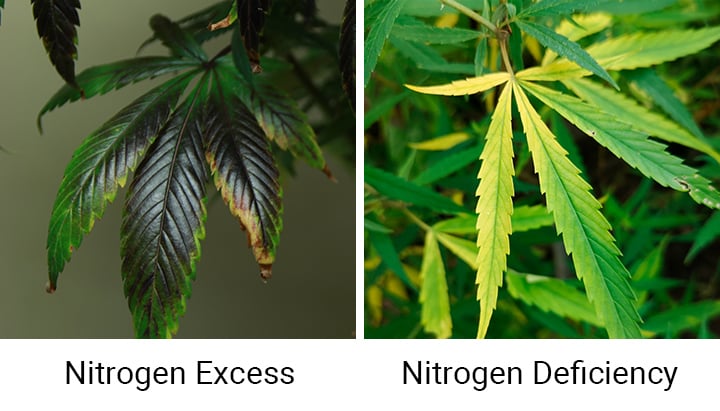
Cannabis and Nitrogen Deficiency: Signs and Symptoms
Look at any nitrogen deficiency chart for cannabis, and you’ll come across key signs that indicate a lack of this element. Discover the symptoms below to know what to look out for.
Stunted Growth
A lack of nitrogen can result in lacklustre growth and development during all stages of the growing cycle. Unlike humans and animals, who have an extracellular matrix made up of proteins, plants are structurally composed of carbohydrate polymers. However, nitrogen still plays a crucial role in plant growth because of its role in photosynthesis and myriad chemical reactions that require proteins. Nitrogen deficiency can result in plants that lack vigour and seem stunted and dwarfed compared to healthy specimens.
Yellow Leaves
Yellowing older leaves is a common symptom of nitrogen deficiency. As a mobile nutrient, plants have the ability to move their nitrogen stores to areas where they are needed most—namely, new, younger growth. During a dearth, plants ferry nitrogen away from older leaves, leaving them without ample levels to create adequate chlorophyll molecules, resulting in a yellow appearance.
Pale Green Leaves
Before turning completely yellow, you’ll notice older leaves take on a pale green colour. Again, this stems from inhibiting chlorophyll production. Low levels of this green pigment change both the chemistry within leaves as well as their external physical appearance.
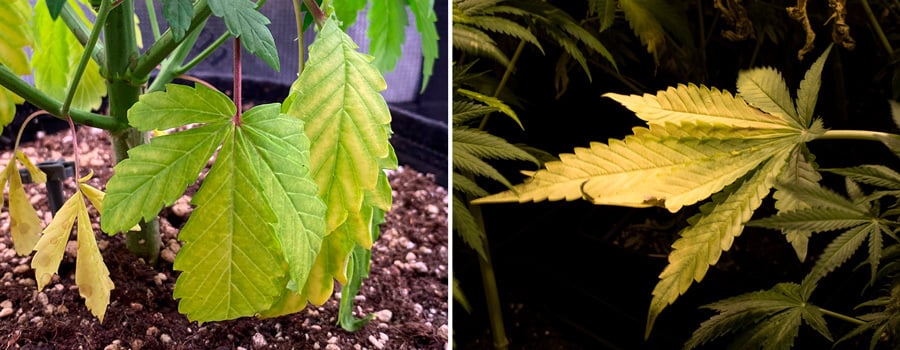
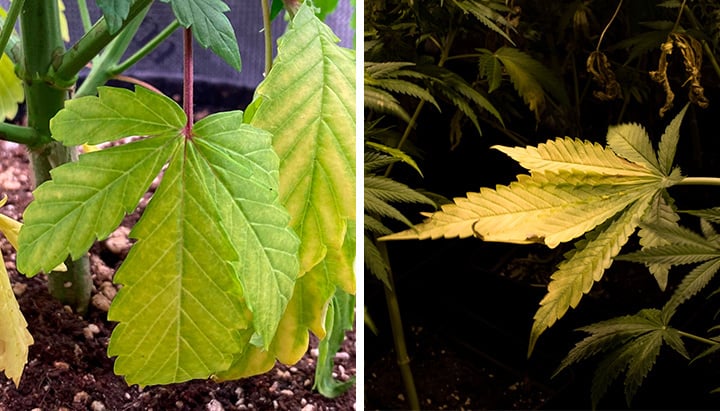
Reduced Leaf Size
Impacted growth doesn’t just lead to stunted plants, but it also gives rise to a reduced leaf size. Photosynthesis converts gaseous carbon into organic matter within plants, which use this substance to create their structural extracellular matrix. When chlorophyll levels drop owing to a lack of nitrogen, organic matter production also drops. This leaves plants with a lack of structural components to create large and luscious leaves, forcing them to create smaller and less functional leaves instead.
Delayed Flowering
Many plant hormones play important roles in the flowering process. Cytokinins and auxins help to drive the formation and growth of buds, whereas abscisin and ethylene are involved in maturation and ripening. The nitrogen signalling pathway within plants contributes to the production of key flowering hormones, including cytokinins, auxins, and ethylene, meaning a nitrogen deficiency can slow both flower development and maturation.
Lower Branch Die-Off
The movement of nitrogen from older growth to newer doesn’t only affect the colour of more mature leaves. When nitrogen supplies become considerably low, plants remove enough of the element from lower portions of the plant that they begin to die. Leaves, petioles, and the branches themselves start to die off owing to a lack of photosynthesis and life-giving chemical reactions dependent upon vital proteins.
Causes of Nitrogen Deficiency When Growing Weed
As soon as you see these symptoms arise, it makes logical sense to want to fix them. However, before you start focusing on solutions, you need to discover the root cause of the issue.
Poor Cation Exchange Capacity
Cation exchange capacity (CEC) refers to the ability of the soil to hold on to positively charged ions called cations. Nitrogen exists in several forms in the soil, including the positively charged cation ammonium and the negatively charged anion nitrate. Plants that prefer more acidic soil conditions, such as cannabis, prefer taking up their nitrogen in the form of ammonium. Therefore, it helps to have soil with a net negative electric charge based on the following logic: two negatively charged substances repel each other, whereas one negatively charged and one positively charged substance attract each other.
Several fractions of the soil possess a net negative electric charge, including clay and organic matter. Adequate levels of these two substances enhance the CEC of soil in the sense that they bind up ammonium and other cations, preventing them from leaching away. Once locked in place, plants are able to dislodge and uptake them by releasing hydrogen cations into the soil that possess a stronger positive charge—and therefore a greater ability to bind to negatively charged surfaces—than ammonium cations.
An optimal CEC means your plant roots have good access to ionic forms of nitrogen in the soil. Conversely, soil that lacks clay and organic matter will have poor CEC. This soil fails to hold on to ammonium that leaches out due to weathering, leaving cannabis plants at a disadvantage and predisposing them to nitrogen deficiencies.

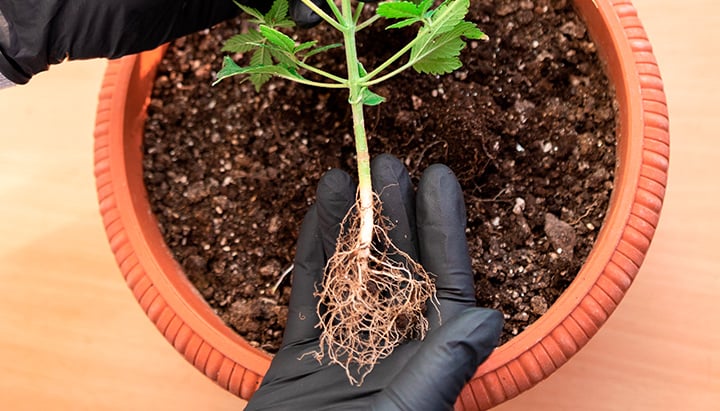
Lack of Microbial Life
Nitrogen doesn’t just exist in the soil as cations bound up in certain fractions of the soil. Large amounts of nitrogen are also bound up in the bodies of countless species of microbes that live in and around plant roots. These critters form part of the soil food web—an interlinking series of food chains that cycle nutrients, including nitrogen. But how do plants gain access to the nitrogen locked away in microbial organisms?
A cannabis plant’s access to this nitrogen depends upon a dynamic and functional soil food web. Living soil filled with the appropriate life will cycle these nutrients all the way down to freeform ammonium ripe for the picking. For example, small worm-like creatures called nematodes feast on soil bacteria and excrete excess ammonium back into the soil, ready to bind to negatively charged particles.
However, plants don’t just wait patiently for this process to unfold; they take direct action to ensure they reap the rewards of these natural processes. Much of the sugars that plants make during photosynthesis is directed down into the root zone, purely with the intention of attracting the very bacteria they rely on to access nitrogen. Having bacteria close by means the nitrogen-liberating nematodes, and other critters, aren’t far behind.
Adding to this, plant roots consume entire bacterial cells through the rhizophagy cycle[1], sometimes with the help of soil algae that act as a sort of taxi cab service for bacteria into roots. Complex chemical processes then strip down internalised bacteria to harvest nitrogen, before releasing them back into the soil to gather more nitrogen for the plant.
As you can see, soil microbes play a key role in helping plants gain access to nutrients. When the diversity of soil life collapses, due to chemical fertilisers, tilling, and pesticides, plants also take a huge hit. Sometimes, this manifests as nitrogen deficiency.
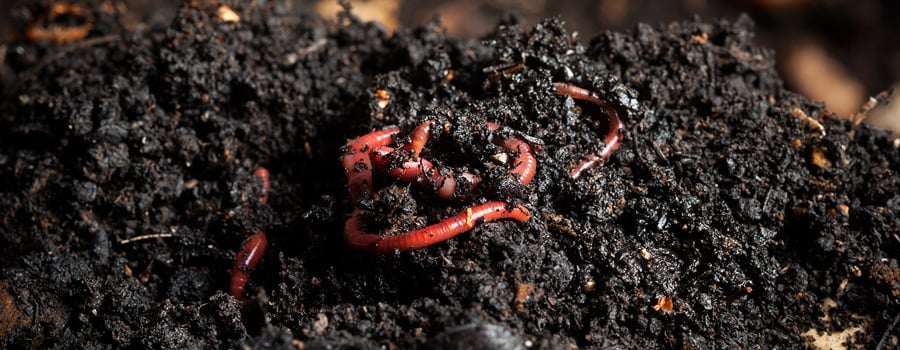
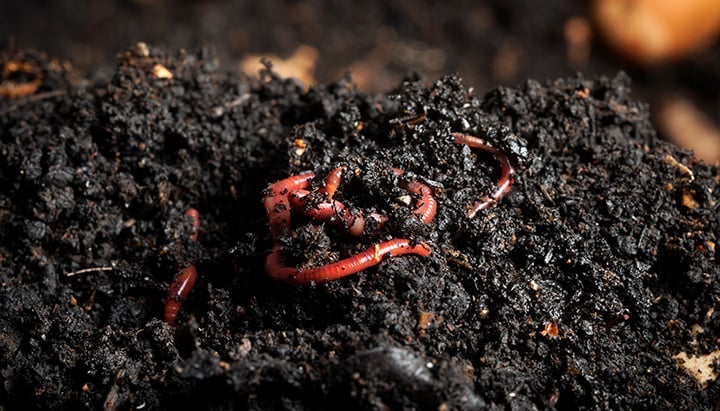
pH Imbalance
pH refers to the amount of hydrogen cations present in the soil; high concentrations lead to acidic conditions, whereas low concentrations give rise to alkaline conditions. Cannabis prefers a slightly acidic pH of around 6.0—a chemical condition in which nitrogen exists as ammonium. Slightly alkaline soils convert ammonium into the anion nitrate, which cannabis plants can still use as a source of nitrogen.
However, pH extremes can inhibit the ability of cannabis plants to uptake nitrogen. For example, an excessively low pH can cause a lockout of ammonium by causing both aluminium and manganese toxicity. Plus, large pH fluctuations can throw microbial life out of balance, which has the knock-on effect of reducing access to nitrogen supplies.
How to Treat Nitrogen Deficiency in Cannabis Plants
And just like that, you know the root causes of marijuana nitrogen deficiency. With this newfound knowledge, you know the exact variables that you need to change to re-establish balance in your soil. However, outside of tampering with soil biochemistry, there are also some quick fixes that can rapidly address nitrogen deficiency at the surface level.
- Apply Ionic Nutrients as a Root Drench
- We get it—yellowing leaves and dying branches have sent you into a panic. Before we delve into how to solve this problem in the long term, we’re going to equip you with a couple of fast-acting solutions. First of all, you’ll need to get your hands on some synthetic nitrogen fertiliser. Yes, this runs contrary to the advice given on soil life above, but it’ll work to secure your harvest this time around. Simply apply it according to product instructions around the base of your plant, and watch the symptoms start to wane.
- Apply a Nitrogen-Rich Foliar Spray
- If your plant is in considerably bad shape, consider using a nitrogen foliar spray instead. Luckily, you don’t need to rely on synthetic fertilisers for this approach. Cannabis leaves possess many tiny pores called stomata, which they use to uptake atmospheric carbon and release water and oxygen. These openings also serve as a quick way to get nutrients into your plants. Grab a bottle of liquid seaweed or fish emulsion and apply it with a misting bottle according to product instructions.
- Adjust Soil pH
- Using a pH tester, you can quickly get a reading of how acidic or alkaline your soil is. If it’s out of whack, you can quickly raise or lower pH using pH up or down products. In the long term, you can also adjust pH using organic means; compost, peat moss, and wood chips lower pH, whereas dolomitic lime can raise it.
How to Prevent Nitrogen Deficiency When Growing Marijuana
Now that you’re aware of some important quick fixes, you can make the necessary changes to your cultivation approach to prevent nitrogen deficiency from rearing its head again in the future.
Improve Your Soil Biology
Boosting soil biology involves two different approaches: prebiotic (feeding the microbes already there) and probiotic (inoculating your soil with new microbes). The prebiotic approach involves adding material that serves as microbial food. Both dead material and living roots provide sources of carbon and bolster microbial life. These include:
- Dead mulch: Compost, straw, well-rotted wood chips, manure, dead leaves
- Living mulch: Crimson clover, white clover, lettuce, spinach, squash, pumpkin
- Cover crops: Broad beans, alfalfa, pea, radish, clover
To inoculate your soil with new microbes, apply the following:
- Compost as a mulch throughout the growing season
- Compost tea as a foliar spray throughout the growing season
- Mycorrhizal fungi during sowing and transplanting
- Trichoderma during sowing and transplanting
- Rhizobacteria during sowing and transplanting
Refine Your Feeding Regimen
If you prefer to grow using synthetic products, make sure you follow the product instructions appropriately. Carefully monitor the feeding schedule provided, and ensure you’re applying the correct quantities at the right time in the growing cycle.
Improve Cation Exchange Capacity
Boosting cation exchange capacity will dramatically reduce the chances of nitrogen deficiency. To achieve this, amend your soil with clay and mature compost. Both of these inputs possess a net negative charge and will keep ammonium right next to your plant roots so they can access it as needed.
Frequently Measure Soil pH
Keep tabs on the pH of your soil. Taking frequent readings will allow you to act quickly before any drastic fluctuation occurs. This will allow your plants to maintain access to nitrogen in the soil, and will shield beneficial microbial communities from pH extremes.
Make Your Own Compost
Making your own compost will save you a lot of money in the long run, and also boost the health and productivity of your plants; you simply can’t buy the quality of proper compost from any shop shelf. Dump your garden waste and kitchen scraps, along with some cardboard and wood chips, into a pile, wait a few months, and you’ll have a microbe-rich and nutrient-filled tool, with a net negative charge to boot, and at your disposal.
Lay Off the Synthetic Fertiliser
Reduce your use of synthetic fertilisers or forgo them altogether where possible. They help tremendously when it comes to quickly addressing a deficiency, but do more harm than good when not needed. Instead, work on building living soil that cycles nutrients and becomes more fertile with each growing season.
Nitrogen: A Critical Cannabis Macronutrient
As you can see, nitrogen plays a key role when growing weed. It contributes to photosynthesis and critical chemical reactions. Without it, plants underperform; they become stunted, yellow, and sickly. The key causes of nitrogen deficiency include poor CEC, imbalanced pH, and a lack of microbial life. If you come across nitrogen deficiency, you now know to use soil drenches and foliar sprays as a quick fix. In the long term, improving your soil life and CEC, monitoring pH, and keeping a close eye on your feeding schedule will help you avoid it.
- Rhizophagy Cycle: An Oxidative Process in Plants for Nutrient Extraction from Symbiotic Microbes - PMC https://www.ncbi.nlm.nih.gov


























